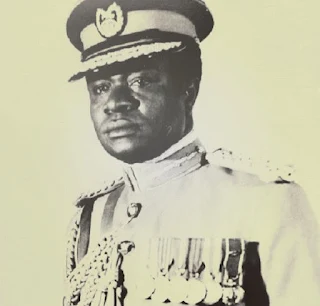From Military Coup to Self-Reliance to Firing Squad
Colonel Ignatius Kutu Acheampong's execution in 1979 did not diminish the impact of his Operation Feed Yourself and Africanization policies, which remained key policies in Ghana.
 |
| Colonel Ignatius Kutu Acheampong |
Colonel Ignatius Kutu Acheampong and the Supreme Military Council
The Supreme Military Council came into existence in January 1972 following a military coup led by Colonel Ignatius Kutu Acheampong. It introduced notable policies, such as the Operation Feed Yourself and the Africanization Policy.
Colonel Ignatius Kutu Acheampong, born on September 23, 1931, in Kumasi, Ghana, holds a prominent place in Ghanaian history due to his pivotal role as a military leader and political figure during a crucial era. His early life saw him receiving an education in Ghana and then enrolling in the Ghana Military Academy, where he embarked on a military career that would eventually lead him to national prominence.
Acheampong's rise through the ranks of the Ghana Armed Forces culminated in his involvement with the National Redemption Council, a military junta that seized power through a coup in 1972. Within the National Redemption Council, he served as the second-in-command under General A.K. Afrifa. However, his defining moment arrived when he led another coup in 1972 that toppled the National Redemption Council's leadership, including Afrifa, propelling him into the position of Chairman of the Supreme Military Council and effectively making him the leader of Ghana.
Operation Feed Yourself
As the head of the Supreme Military Council, Acheampong introduced several notable policies, such as the Operation Feed Yourself campaign, to bolster local agricultural production and reduce reliance on food imports. Under Acheampong's guidance, Operation Feed Yourself encouraged Ghanaians to actively participate in farming and food production, particularly in rural areas.
The initiative sought to empower individuals and communities to take charge of food security by cultivating crops and raising livestock for personal consumption and local markets. This was in response to the country's economic challenges, including a reliance on imported food that strained Ghana's foreign currency reserves. Acheampong's government also encouraged urban dwellers to engage in small-scale farming to help meet their food needs and contribute to achieving food self-sufficiency. His leadership also brought about the Africanization Policy.
Africanization Policy
Colonel Ignatius Kutu Acheampong's Africanization Policy was a key component of his leadership as the head of Ghana's Supreme Military Council in the 1970s. This policy was designed to promote indigenous Ghanaian ownership in businesses and reduce the influence of foreign economic interests in the country.
At its core, the Africanization Policy aimed to empower Ghanaians by encouraging them to take control of various sectors of the economy that had been historically dominated by foreign investors and multinational corporations. Acheampong's government prioritized Ghanaian ownership and management in banking, commerce, industry, and trade. This aligned with the broader goal of achieving economic self-reliance and reducing external financialcompanies control.
Under this policy, several measures were implemented, including requiring foreign-owned businesses to Ghanaianize their operations by selling most of their shares to Ghanaian citizens. Additionally, the government provided support and incentives to facilitate the growth of indigenous businesses, fostering economic development within the country.
The Africanization Policy was challenging, including issues related to the transition of ownership and the need for capital investment to sustain newly acquired enterprises. Nevertheless, it represented Acheampong's commitment to promoting economic empowerment and sovereignty for Ghana, allowing the nation greater control over its financial destiny.
Acheampong's rule was marked by challenges.
Even though two notable policies, Operation Feed Yourself and the Africanization Policy, were implemented, Acheampong's rule was marked by challenges, including economic instability, inflation, and political turmoil. As his leadership continued, public dissatisfaction grew due to financial challenges and allegations of corruption. This discontent culminated in further unrest and a series of protests, ultimately leading to his overthrow in a coup led by Lieutenant General Frederick Akuffo in July 1978.
After his ouster, Acheampong faced legal repercussions, standing trial on charges related to his time in power. Ultimately, in 1979, he was sentenced to death alongside two other former military leaders. He died June 16, 1979 in Accra, Ghana, through execution by a firing squad. The primary reason for his execution was his role in the military government and the failures and abuses of power during his time in leadership.
Colonel Ignatius Kutu Acheampong's legacy remains a significant but controversial chapter in Ghana's history, embodying a period of military rule and the subsequent transition back to civilian governance. His leadership is characterized by policies promoting self-sufficiency and indigenous ownership, as challenges like economic instability and political discontent continue to be studied and debated in Ghana's political and economic development.

























